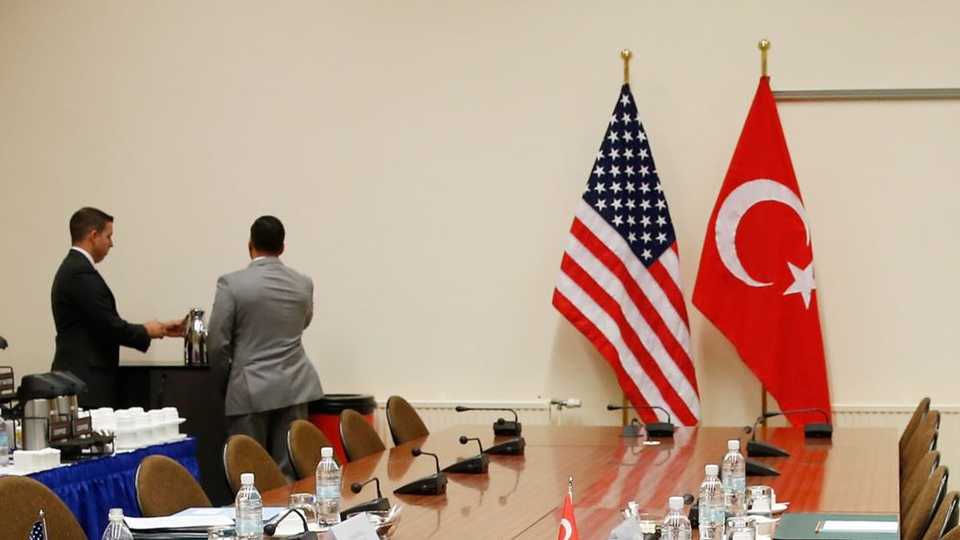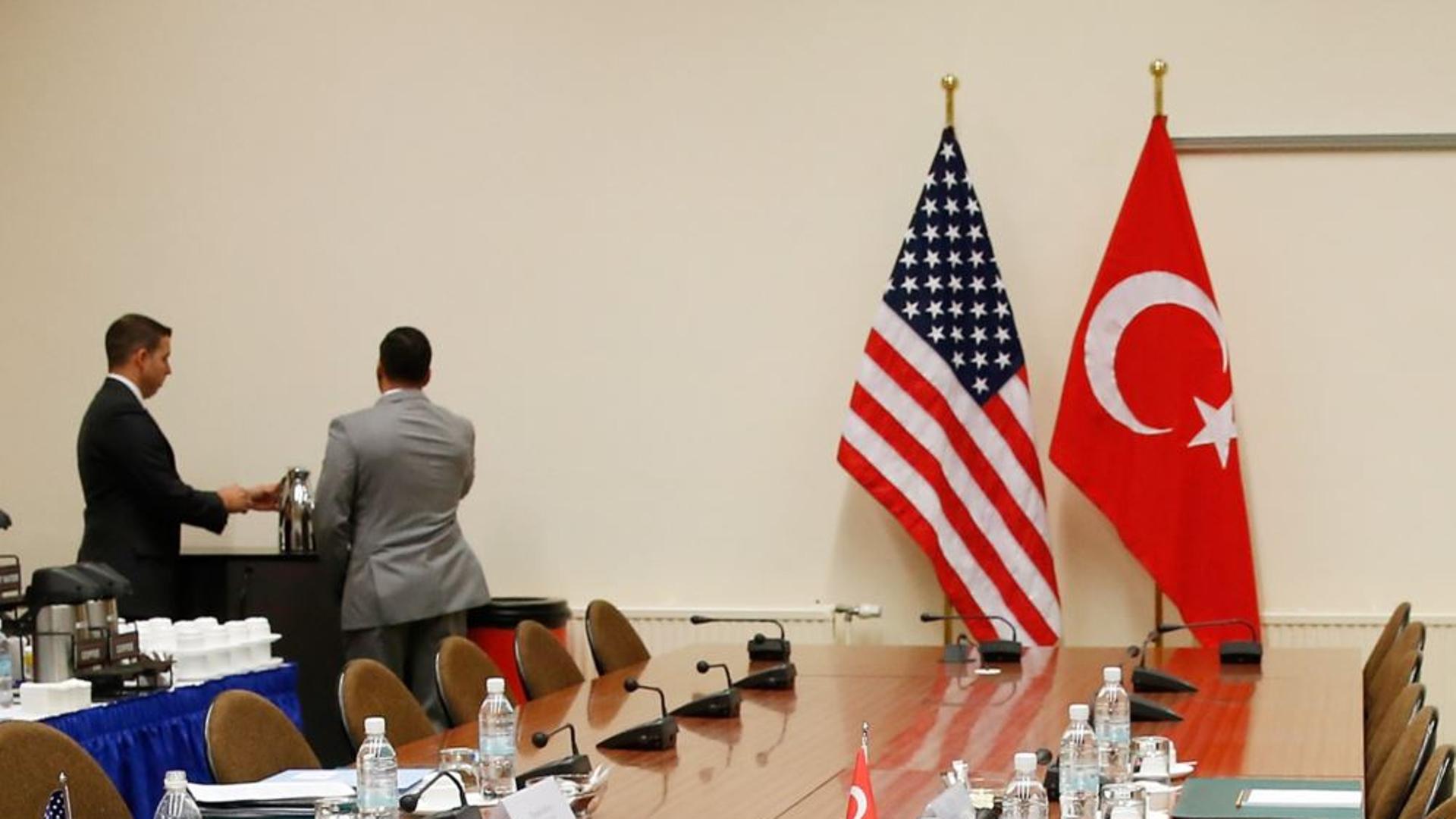
Turkey and the United States have been working on a plan to stabilise Manbij since February. They came to a common understanding on a plan last week when a US delegation met with Turkish counterparts in Ankara, Turkish state-run Anadolu Agency cited a source who witnessed the talks between the two countries.
Under the terms of this three-step plan, the YPG will withdraw from Manbij in 30 days after the deal is signed, the report said on Wednesday.
The source said the US side found Turkey’s proposal of the three-step plan favourable and pointed to Turkish Foreign Minister Mevlut Cavusoglu’s visit to Washington on June 4, where the last words will be said.
Turkish and US military forces will start joint supervision in Manbij 45 days after the agreement is signed on June 4, when Cavusoglu will meet his American counterpart Mike Pompeo, and a local administration will be formed in 60 days, the Anadolu report said.
However, US State Department spokesperson Heather Nauert denied the reports on Wednesday, saying they are continuing to have ongoing conversations.
“We don’t have any agreements yet with the government of Turkey. We announced previously that the United States and the Turkish working group met … in Ankara on Friday of last week,” Nauert said, during a daily press briefing.
“We’re continuing to have ongoing conversations regarding Syria and other issues of mutual concern. The two sides then had outlined the contours of a road map for further cooperation, and that includes on Manbij,” she said.
During his Washington visit, Cavusoglu will meet his US counterpart Mike Pompeo with a packed agenda in their second meeting after Pompeo took office last month.
And Syria’s Manbij is expected to dominate the meeting between the two top diplomats as YGP presence in Manbij and US military support to the group stand as a primary concern for Turkey.
The YPG is the Syrian affiliate of the PKK, a designated terror group by Turkey and the US, and has been fighting the Turkish state for more than 30 years. The US has been supporting the YPG in Syria since late 2014 and that has raised tensions between the two countries.
Turkey and the US on Manbij issue
Turkey launched Operation Olive Branch on January 20 to clear terrorist groups from Afrin, including both Daesh and YPG.
The object of clearing Daesh from northern Syria was successful, but YPG presence in the region close to the Turkish border remains so does the US support for the group.
Ankara says it might also extend its military operation further east to Manbij unless the YPG leaves the strategically located city.
The US considers the YPG to be a key ally in the fight against Daesh, endangering relations which have already strained due to a number of incidents, including the extradition of Fetullah Gulen, leader of Fetullah Terror Organisation, or FETO.
The US soldiers and military advisers are also based in Manbij, preventing any Turkish military operation on the city against the YPG, which is considered a threat to Turkey’s national security.
Following a visit by former US Secretary of State Rex Tillerson to Ankara in February, Turkey and the US established a mechanism to address separate issues in working groups, including the stabilisation of Manbij and to prevent any undesirable clashes.
The first meeting of the working group on Syria was held this March in Washington.
Cavusoglu planned to visit Washington to take further steps on Manbij on March 19, but US President Donald Trump ousted then secretary of state Rex Tillerson before the date, and the visit was postponed. Mike Pompeo has been assigned as the new secretary of state.
The next day on March 20, Cavusoglu said the road map for Manbij included YPG’s withdrawal and the US and Turkey will help set up a local council to govern the city. Security will be provided by both countries.
“I will speak to Pompeo and will continue working with him. He should have the same approach [to the Manbij issue] as Tillerson,” he added.
Meanwhile, the delegations continued holding meetings. A US delegation arrived in Turkey this month for the talks.
Despite Nauert’s denial over any agreement ahead of Cavusoglu’s Washington visit, statements coming from the Turkish side indicate that the two sides were close to reaching a deal on Manbij.
Following a statement by the Turkish foreign ministry on May 25, declaring both countries outlined the main contours of a roadmap on Manbij, Turkish Prime Minister Binali Yildirim said, “The western part of the Euphrates has been cleared,” referring to the YPG presence in Manbij.
“Its east will be the same as well. There’s no other way. We can never live next to terror. We don’t allow this,” Yildirim said, during a rally.
Former US president Barack Obama deployed around 50 troops to Syria as advisors and observers in late 2015, mostly to work with the YPG. Today, there are roughly 2,000 American troops in the country based in several US military bases, within the YPG-held areas.
This year, the US established two new military bases in Manbij to prevent a military operation against the group. To the north of Manbij, Turkish-backed Syrian opposition forces and Turkish troops are based, as a small river creates a natural border line between two groups.
Now, Cavusoglu and Pompeo will work on finalising the roadmap and announcing the agreement reached.
Their meeting will also focus on Turkey’s fight against FETO and defence cooperation.
Extradition of Fetullah Gulen
Turkey repeatedly requested the extradition of Gulen from the United States, where he has been in self-exile since the late 1990s. Ankara provided boxes of documents to Washington with evidence linking FETO to the July 15 coup attempt.
At least 250 people were killed and hundreds of others were injured after members of FETO attempted a coup in July 2016 to overthrow the AK Party government.
However, US authorities claim they are still working on the documents, delaying a response to Turkey’s request.
Two weeks ago, a US judge sentenced a former Turkish banker, Hakan Atilla, for allegedly taking part in a scheme to help Iran evade US sanctions.
Turkey said the US case was a continuation of the December 2013 indictments when Turkish prosecutors linked to FETO started an alleged corruption investigation on senior members of the Turkish government.
The government later said the documents were fabricated in a bid to topple Recep Tayyip Erdogan, who was prime minister at the time. He was then elected as the president of the country in 2014.
Cavusoglu is expected to mention Turkey’s discomfort with the case once again to the US authorities during his visit.
Purchase of US F35 fighter jets
Democratic Senator Jeanne Shaheen and Republican Senator Thom Tillis brought a bill to the US Senate committee which passed on Thursday, including a measure to prevent Turkey from purchasing Lockheed Martin F-35 Joint Strike Fighter jets.
Shaheen’s office said the amendment would remove Turkey from the F-35 program over its detention of US citizen Andrew Brunson.
Brunson, a Christian pastor who could be jailed for up to 35 years, was detained by Turkish security forces in December 2016 for allegedly spying, divulging state secrets and links to FETO. Brunson has denied the accusations.
The senators also insist the US should limit defense cooperation with Turkey on account of its deal with Russia to buy S-400 surface-to-air defence missile batteries.
Turkey, in return, warned that it could retaliate if the US takes such a step.
“If they take such a step at a moment when we are trying to mend our bilateral ties, they will sure get a response from Turkey,” Cavusoglu told the private broadcaster in an interview on May 6.
Turkey has ordered 116 F35 fighter jets from the US for $25 billion. The first delivery is expected on June 21.
The purchase of F35 jets will also be on the agenda during the meeting between Cavusoglu and Pompeo.










Discussion about this post